Contents
Preface
Acknowledgments
Chapter 1 Basics
Gotcha #1: Excessive Commenting
Gotcha #2: Magic Numbers
Gotcha #3: Global Variables
Gotcha #4: Failure to Distinguish Overloading from Default Initialization
Gotcha #5: Misunderstanding References
Gotcha #6: Misunderstanding Const
Gotcha #7: Ignorance of Base Language Subtleties
Gotcha #8: Failure to Distinguish Access and Visibility
Gotcha #9: Using Bad Language
Gotcha #10: Ignorance of Idiom
Gotcha #11: Unnecessary Cleverness
Gotcha #12: Adolescent Behavior
Chapter 2 Syntax
Gotcha #13: Array/Initializer Confusion
Gotcha #14: Evaluation Order Indecision
Gotcha #15: Precedence Problems
Gotcha #16: for Statement Debacle
Gotcha #17: Maximal Munch Problems
Gotcha #18: Creative Declaration-Specifier Ordering
Gotcha #19: Function/Object Ambiguity
Gotcha #20: Migrating Type-Qualifiers
Gotcha #21: Self-Initialization
Gotcha #22: Static and Extern Types
Gotcha #23: Operator Function Lookup Anomaly
Gotcha #24: Operator -> Subtleties
Chapter 3 The Preprocessor
Gotcha #25: #define Literals
Gotcha #26: #define Pseudofunctions
Gotcha #27: Overuse of #if
Gotcha #28: Side Effects in Assertions
Chapter 4 Conversions
Gotcha #29: Converting through void *
Gotcha #30:Slicing
Gotcha #31: Misunderstanding Pointer-to-Const Conversion
Gotcha #32: Misunderstanding Pointer-to-Pointer-to-Const Conversion
Gotcha #33: Misunderstanding Pointer-to-Pointer-to-Base Conversion
Gotcha #34: Pointer-to-Multidimensional-Array Problems
Gotcha #35: Unchecked Downcasting
Gotcha #36: Misusing Conversion Operators
Gotcha #37: Unintended Constructor Conversion
Gotcha #38: Casting under Multiple Inheritance
Gotcha #39: Casting Incomplete Types
Gotcha #40: Old-Style Casts
Gotcha #41: Static Casts
Gotcha #42: Temporary Initialization of Formal Arguments
Gotcha #43: Temporary Lifetime
Gotcha #44: References and Temporaries
Gotcha #45: Ambiguity Failure of dynamic_cast
Gotcha #46: Misunderstanding Contravariance
Chapter 5 Initialization
Gotcha #47: Assignment/Initialization Confusion
Gotcha #48: Improperly Scoped Variables
Gotcha #49: Failure to Appreciate C++’s Fixation on Copy Operations
Gotcha #50: Bitwise Copy of Class Objects
Gotcha #51: Confusing Initialization and Assignment in Constructors
Gotcha #52: Inconsistent Ordering of the Member Initialization List
Gotcha #53: Virtual Base Default Initialization
Gotcha #54: Copy Constructor Base Initialization
Gotcha #55: Runtime Static Initialization Order
Gotcha #56: Direct versus Copy Initialization
Gotcha #57: Direct Argument Initialization
Gotcha #58: Ignorance of the Return Value Optimizations
Gotcha #59: Initializing a Static Member in a Constructor
Chapter 6 Memory and Resource Management
Gotcha #60: Failure to Distinguish Scalar and Array Allocation
Gotcha #61: Checking for Allocation Failure
Gotcha #62: Replacing Global New and Delete
Gotcha #63: Confusing Scope and Activation of Member new and delete
Gotcha #64: Throwing String Literals
Gotcha #65: Improper Exception Mechanics
Gotcha #66: Abusing Local Addresses
Gotcha #67: Failure to Employ Resource Acquisition Is Initialization
Gotcha #68: Improper Use of auto_ptr
Chapter 7 Polymorphism
Gotcha #69: Type Codes
Gotcha #70: Nonvirtual Base Class Destructor
Gotcha #71: Hiding Nonvirtual Functions
Gotcha #72: Making Template Methods Too Flexible
Gotcha #73: Overloading Virtual Functions
Gotcha #74: Virtual Functions with Default Argument Initializers
Gotcha #75: Calling Virtual Functions in Constructors and Destructors
Gotcha #76: Virtual Assignment
Gotcha #77: Failure to Distinguish among Overloading, Overriding, and Hiding
Gotcha #78: Failure to Grok Virtual Functions and Overriding
Gotcha #79: Dominance Issues
Chapter 8 Class Design
Gotcha #80: Get/Set Interfaces
Gotcha #81: Const and Reference Data Members
Gotcha #82: Not Understanding the Meaning of Const Member Functions
Gotcha #83: Failure to Distinguish Aggregation and Acquaintance
Gotcha #84: Improper Operator Overloading
Gotcha #85: Precedence and Overloading
Gotcha #86: Friend versus Member Operators
Gotcha #87: Problems with Increment and Decrement
Gotcha #88: Misunderstanding Templated Copy Operations
Chapter 9 Hierarchy Design
Gotcha #89: Arrays of Class Objects
Gotcha #90: Improper Container Substitutability
Gotcha #91: Failure to Understand Protected Access
Gotcha #92: Public Inheritance for Code Reuse
Gotcha #93: Concrete Public Base Classes
Gotcha #94: Failure to Employ Degenerate Hierarchies
Gotcha #95: Overuse of Inheritance
Gotcha #96: Type-Based Control Structures
Gotcha #97: Cosmic Hierarchies
Gotcha #98: Asking Personal Questions of an Object
Gotcha #99: Capability Queries
Bibliography
Index
A
B
C
D
E
F
G
H
I
J
K
L
M
N
O
P
Q
R
S
T
U
V
W
Z
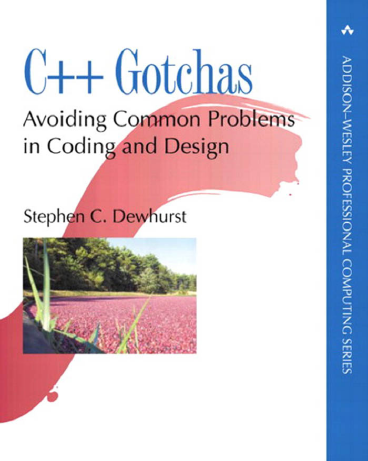

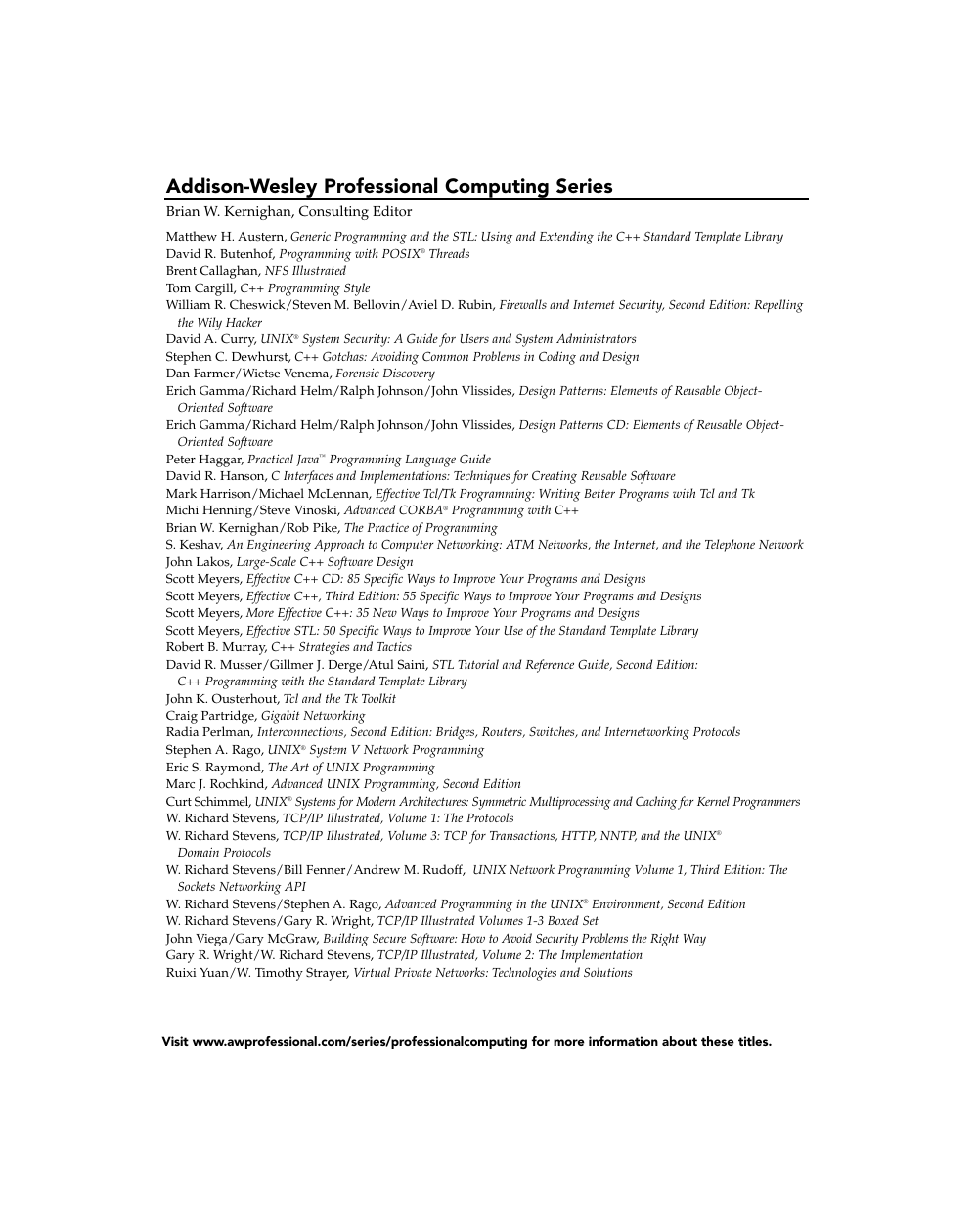
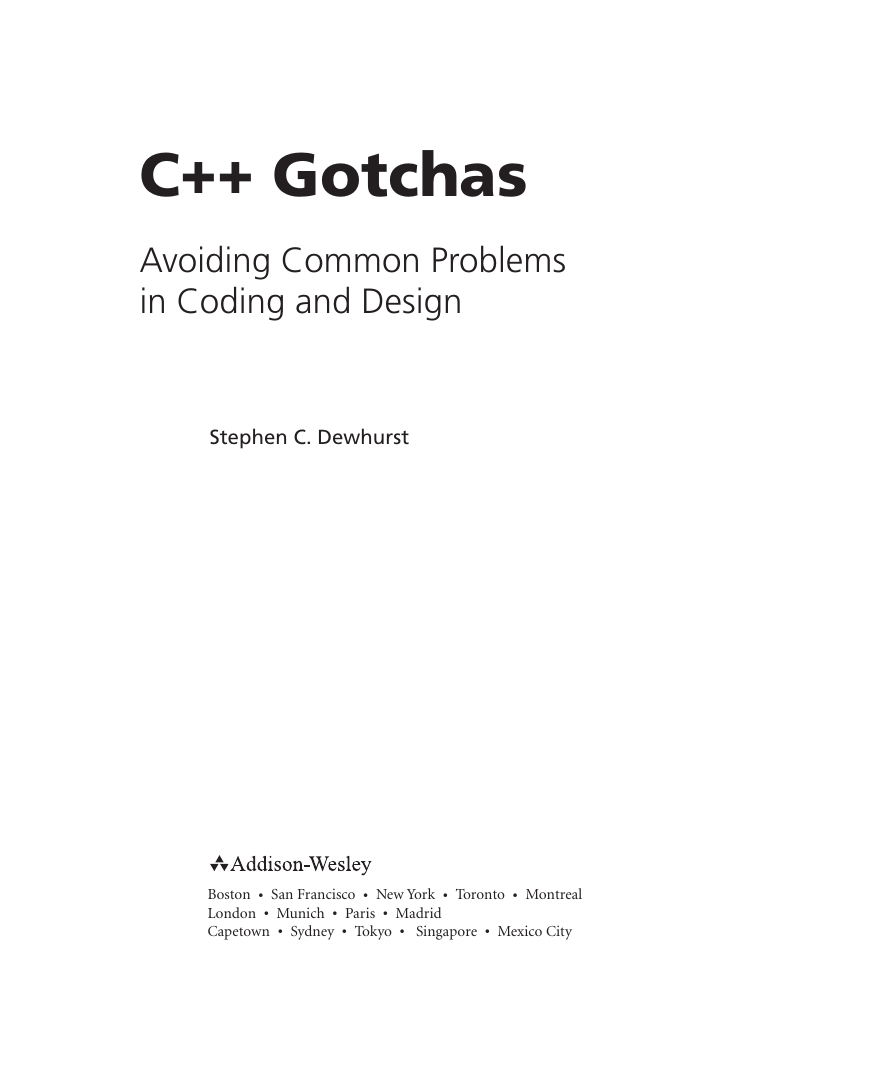

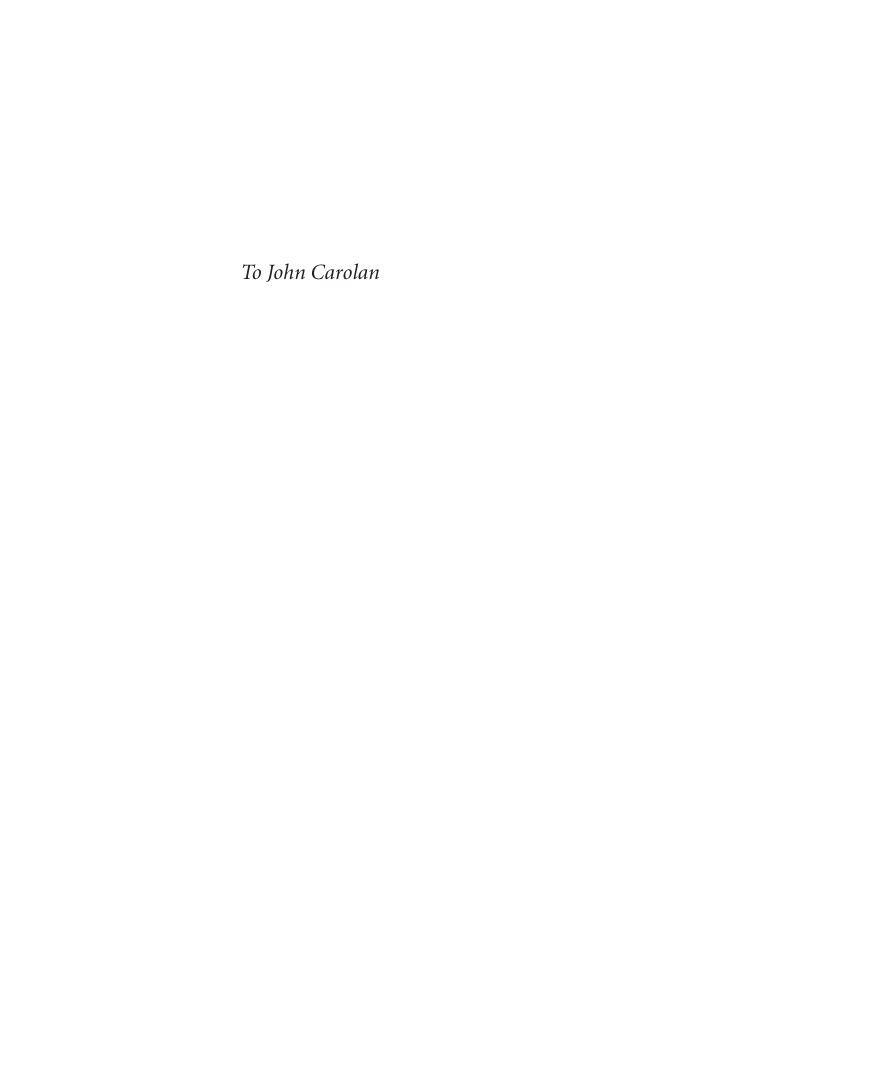

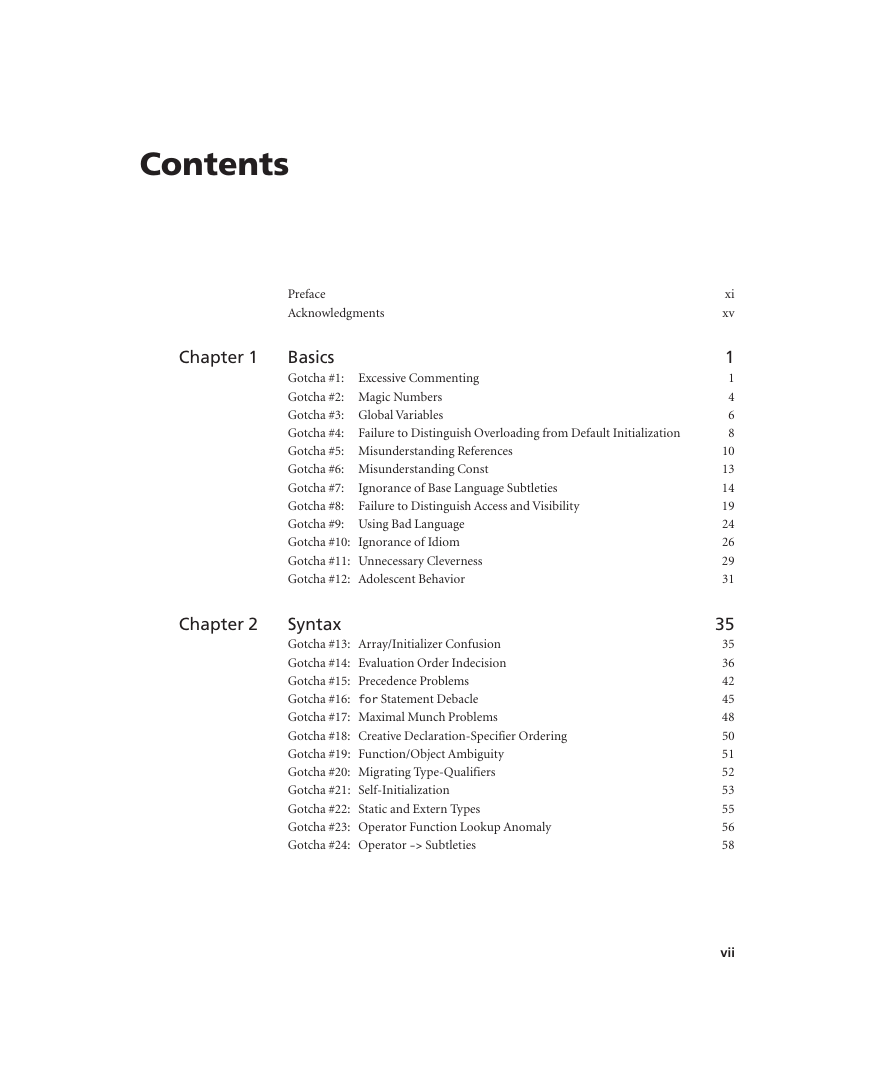








 2023年江西萍乡中考道德与法治真题及答案.doc
2023年江西萍乡中考道德与法治真题及答案.doc 2012年重庆南川中考生物真题及答案.doc
2012年重庆南川中考生物真题及答案.doc 2013年江西师范大学地理学综合及文艺理论基础考研真题.doc
2013年江西师范大学地理学综合及文艺理论基础考研真题.doc 2020年四川甘孜小升初语文真题及答案I卷.doc
2020年四川甘孜小升初语文真题及答案I卷.doc 2020年注册岩土工程师专业基础考试真题及答案.doc
2020年注册岩土工程师专业基础考试真题及答案.doc 2023-2024学年福建省厦门市九年级上学期数学月考试题及答案.doc
2023-2024学年福建省厦门市九年级上学期数学月考试题及答案.doc 2021-2022学年辽宁省沈阳市大东区九年级上学期语文期末试题及答案.doc
2021-2022学年辽宁省沈阳市大东区九年级上学期语文期末试题及答案.doc 2022-2023学年北京东城区初三第一学期物理期末试卷及答案.doc
2022-2023学年北京东城区初三第一学期物理期末试卷及答案.doc 2018上半年江西教师资格初中地理学科知识与教学能力真题及答案.doc
2018上半年江西教师资格初中地理学科知识与教学能力真题及答案.doc 2012年河北国家公务员申论考试真题及答案-省级.doc
2012年河北国家公务员申论考试真题及答案-省级.doc 2020-2021学年江苏省扬州市江都区邵樊片九年级上学期数学第一次质量检测试题及答案.doc
2020-2021学年江苏省扬州市江都区邵樊片九年级上学期数学第一次质量检测试题及答案.doc 2022下半年黑龙江教师资格证中学综合素质真题及答案.doc
2022下半年黑龙江教师资格证中学综合素质真题及答案.doc